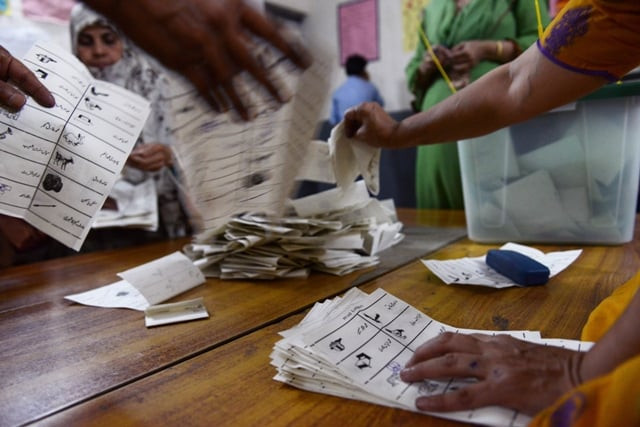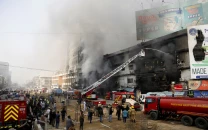Post-elections report: ECP admits shortcomings in 2013 polls
Says politicised civil servants did not perform duties with honesty.

Post-elections report: ECP admits shortcomings in 2013 polls
The report was compiled by post-elections review committee, comprising officials from the ECP, United Nations Development Programme (UNDP) and International Foundation for Electoral Systems (IFES). The committee was constituted by the ECP after the May 11, 2013 elections. The committee completed its 175-page report in December last year but it was not made public due to unknown reasons.
Now available on the ECP website, the report acknowledged that despite the fact that many international observers termed the 2013 polls ‘fairer than any previous elections’, they were not free from shortcomings.
“Despite the historic success of the 2013 general elections, the polls were not without significant challenges, foremost of which were the prevalent security challenges in many parts of the country, and an electoral management system that struggled to exert effective control to the lowest level,” the report says.
Pre-polls short comings
According to the report, during the pre-elections phase, teams appointed by the ECP for campaign monitoring could not deliver the expected outcome and violations of the code of conduct by some candidates went unnoticed in some areas. “The elections authorities also faced lack of support from political parties and contesting candidates who were seen violating the code of conduct that was formulated in consultation with them.”
It says that the returning officers (ROs), taken from the lower judiciary, were given authority to accept or reject nomination papers of the contesting candidates during the scrutiny of the applications according to Articles 62 and 63 of the Constitution. “However, since the interpretation of these provisions of the Constitution are subjective, the application of these clauses varied from one RO to another,” it adds.
The report says that the commission tried to obtain and make public records of potential candidates from the State Bank, Federal Board of Revenue (FBR), NAB and NADRA. “But the scrutiny period was too short, and some of these organisations did not provide information in the required time, so candidates were cleared without proper verification.”
The report states: “A centralised scrutiny cell was set up in the ECP Secretariat with members from NAB, SBP, FBR and NADRA to verify the candidates’ nomination papers. This cell did not perform effectively.”
Compiling of results
The report says that the ECP introduced a computerised Result Management System (RMS) for the first time but it failed to work. “Due to certain flaws in that system, no result was received during entire first night after poll in respect of Sindh province. The DROs/ROs informed that result is being delayed as the RMS system ran very slow.”
The report further says that the RMS provided by UNDP did not function properly from the very first day of its installation as the persons appointed to work for this system had no proper knowledge of the software of said system. “As a result, most of the returning officers prepared the result sheets manually.”
The report points out that magnetised ink stamp pads and normal stamps pads did not have distinct difference “which might have caused confusion to the election staff.”
Lack of coordination
The report acknowledges that coordination, both within the ECP and between the ECP and its partners, remained quite weak. It says that coordination among the ROs, civil bureaucracy, line departments and ECP’s field officers was also insufficient.
“There was a general perception that as the DROs and the ROs were from the judiciary, they did not consider ECP’s officers to be of an equivalent rank as themselves and thus were often unresponsive and uncooperative towards them” it adds.
“There were also complaints that some officers from the line departments, police, civil administration, etc, were politically influenced and did not conduct their election duties in a transparent and neutral manner,” the report adds. “Election observers and media personnel in particular were not adequately trained on election operations and procedures and they often sent out inaccurate reports before verifying the facts with the ECP.”
Published in The Express Tribune, September 23rd, 2014.



















COMMENTS
Comments are moderated and generally will be posted if they are on-topic and not abusive.
For more information, please see our Comments FAQ